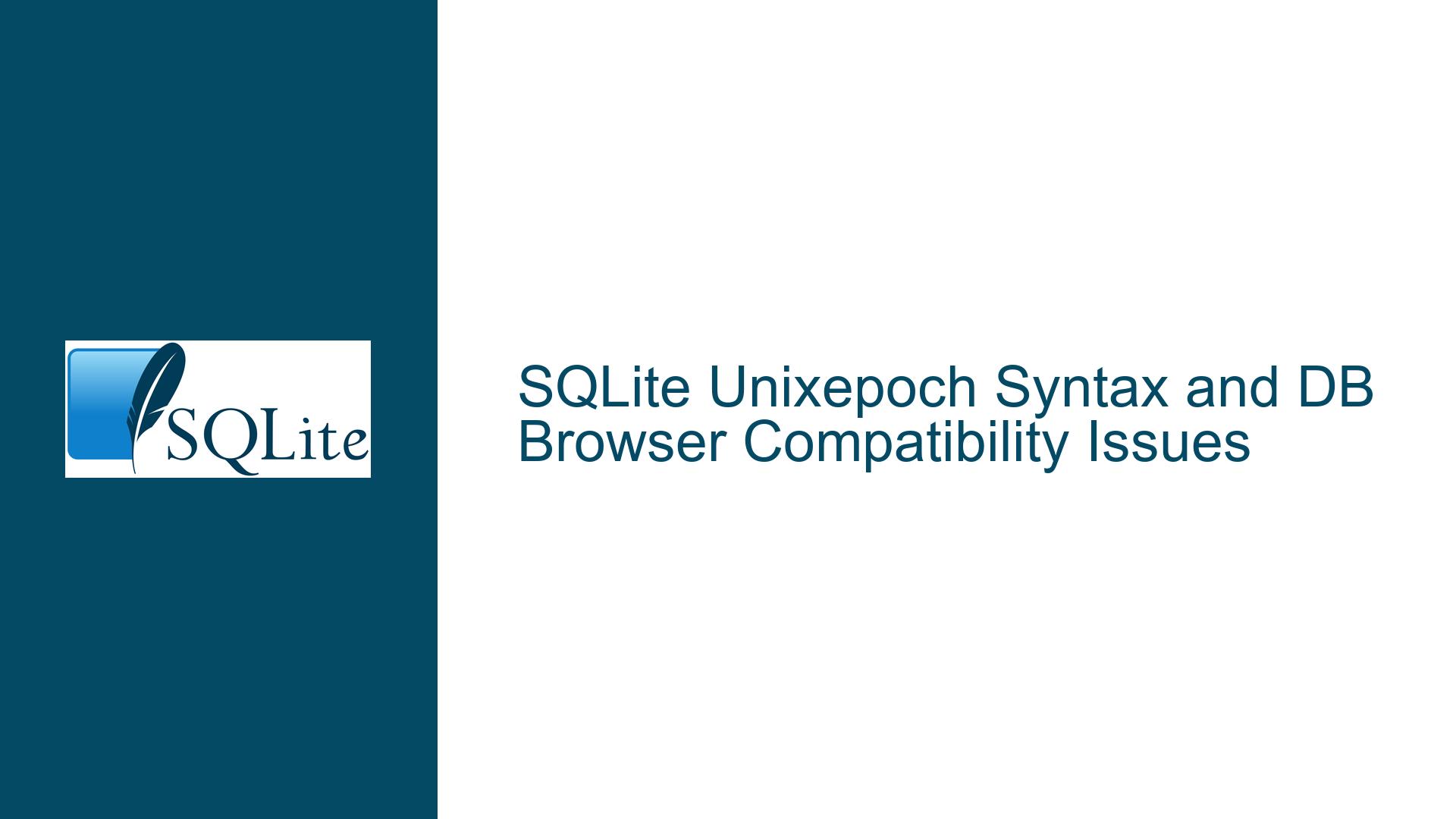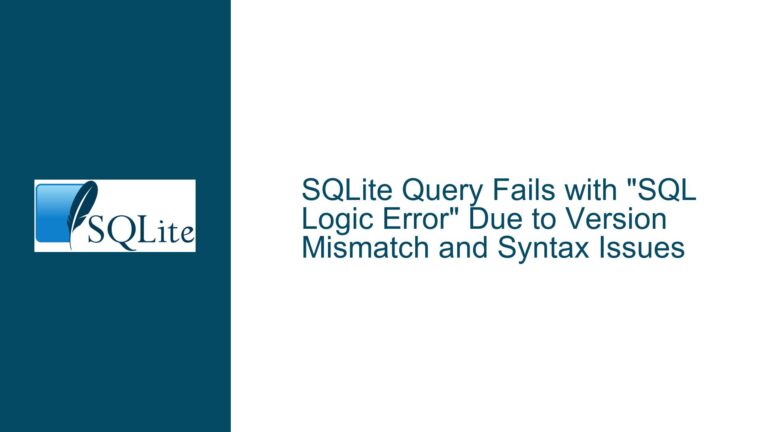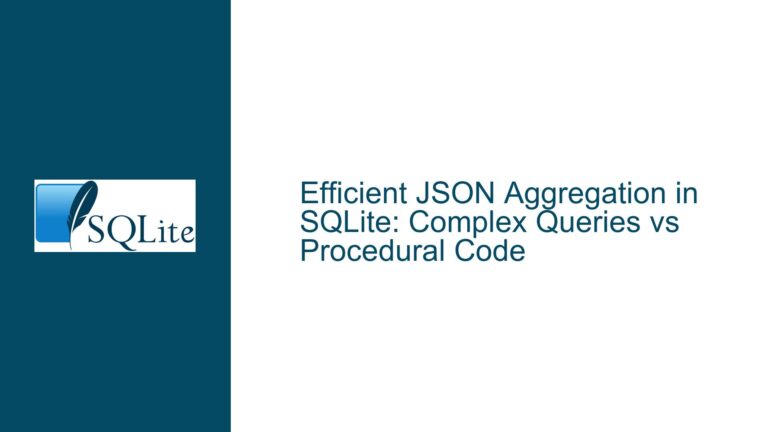SQLite Unixepoch Syntax and DB Browser Compatibility Issues
Understanding Unixepoch and Timestamp Calculations in SQLite
The core issue revolves around the correct usage of SQLite’s unixepoch function for timestamp calculations, particularly when filtering records based on time intervals such as "1 hour ago." The problem is compounded by the interaction between SQLite’s syntax rules and the compatibility of third-party tools like DB Browser for SQLite. This post will dissect the issue, explore its root causes, and provide detailed troubleshooting steps to resolve it.
The Challenge of Unixepoch Syntax and Time-Based Filtering
The primary goal is to filter records from a table where timestamps are stored as Unix epoch values (integers representing seconds since 1970-01-01). The user attempted to use a WHERE clause to select records with timestamps later than "1 hour ago" but encountered syntax errors and unexpected behavior. The initial query looked like this:
...WHERE timestamp > unixepoch(datetime('now','- 1 hours'))
At first glance, this query seems logical, but it fails due to subtle syntax issues and misunderstandings about SQLite’s date and time functions. The unixepoch function, introduced in SQLite 3.38.0, is designed to convert date-time strings into Unix epoch values. However, its usage requires precise syntax, especially when combining it with modifiers like '-1 hour'.
One critical mistake in the query is the space between the minus sign and the number in the time modifier ('- 1 hours'). SQLite’s date and time functions are strict about formatting, and even minor deviations can lead to errors or unexpected results. For example:
SELECT unixepoch('now','- 1 hours'); -- Returns NULL due to the space
SELECT unixepoch('now','-1 hours'); -- Returns the correct Unix epoch value
Additionally, the user attempted to use the datetime function unnecessarily. While datetime('now','-1 hours') is valid, it is redundant when unixepoch can directly accept the same modifiers:
SELECT unixepoch('now','-1 hours'); -- Correct and concise
The user’s confusion highlights a common pitfall: the interplay between SQLite’s date-time functions and their modifiers. Understanding these nuances is crucial for writing effective queries.
Root Causes: Syntax Errors and Tool Compatibility
The issue has two main dimensions: syntax errors in the query and compatibility problems with the DB Browser for SQLite tool.
Syntax Errors
The primary syntax error lies in the incorrect formatting of the time modifier. SQLite’s date and time functions require modifiers to be contiguous, meaning no spaces should separate the minus sign and the number. For example, '-1 hours' is valid, but '- 1 hours' is not. This strict formatting ensures that SQLite can correctly parse and interpret the modifiers.
Another syntax-related issue is the misuse of double quotes for string literals. In SQLite, double quotes are typically used for identifiers (e.g., column names), while single quotes are used for string literals. The user’s query:
SELECT "John" as fn, unixepoch('now', '-1 hour') as timstp;
fails because "John" is interpreted as an identifier rather than a string. The correct syntax uses single quotes:
SELECT 'John' as fn, unixepoch('now', '-1 hour') as timstp;
Tool Compatibility
The second dimension of the issue is the compatibility of the DB Browser for SQLite tool. The user was using version 3.12.2, which bundles an older version of SQLite (from June 2021). This version predates the introduction of the unixepoch function in SQLite 3.38.0, rendering the function unavailable.
Even after correcting the syntax, the query would fail in DB Browser for SQLite 3.12.2 because the underlying SQLite library does not support unixepoch. Additionally, DB Browser for SQLite performs some SQL parsing independently, which can lead to inconsistencies when using newer SQLite features.
Resolving Syntax Errors and Ensuring Tool Compatibility
To address the issue, follow these detailed troubleshooting steps:
Step 1: Correct the Syntax
Ensure that the query adheres to SQLite’s syntax rules. Specifically:
- Use single quotes for string literals.
- Remove spaces between the minus sign and the number in time modifiers.
- Avoid redundant function calls like
datetimewhenunixepochcan handle the modifiers directly.
Here is the corrected query:
SELECT 'John' as fn, unixepoch('now', '-1 hour') as timstp;
Step 2: Verify SQLite Version
Check the version of SQLite used by your tool. You can do this by running:
SELECT sqlite_version();
If the version is older than 3.38.0, the unixepoch function will not be available. In such cases, you have two options:
- Upgrade to a newer version of SQLite.
- Use alternative functions like
strftimeto achieve similar results. For example:
SELECT strftime('%s', 'now', '-1 hour');
Step 3: Update DB Browser for SQLite
If you are using DB Browser for SQLite, ensure that you have the latest version. As of July 2024, version 3.13.0 is available and includes support for newer SQLite features. Download and install the latest version from the official website: https://sqlitebrowser.org/.
Step 4: Replace the SQLite DLL (Optional)
If updating DB Browser for SQLite is not feasible, you can manually replace the bundled sqlite3.dll with a newer version. Follow these steps:
- Download the 64-bit SQLite DLL from the official website: https://www.sqlite.org/download.html.
- Locate the existing
sqlite3.dllin the DB Browser installation directory (e.g.,C:\Program Files\DB Browser for SQLite\sqlite3.dll). - Replace the old DLL with the newly downloaded one.
Note that this approach may not guarantee full compatibility, as DB Browser for SQLite performs some SQL parsing independently.
Step 5: Test the Query
After making the necessary adjustments, test the query to ensure it works as expected. For example:
SELECT 'John' as fn, unixepoch('now', '-1 hour') as timstp;
This should return a result similar to:
John|1723116794
where 1723116794 is the Unix epoch value for "1 hour ago."
Step 6: Debugging and Error Handling
If the query still fails, consider the following debugging steps:
- Check for error messages or warnings in the tool’s console or log.
- Simplify the query to isolate the issue. For example, test
unixepoch('now')without modifiers to verify basic functionality. - Consult SQLite’s official documentation for additional guidance: https://www.sqlite.org/lang_datefunc.html.
By following these steps, you can resolve syntax errors, ensure compatibility with your tools, and effectively use SQLite’s date and time functions for timestamp calculations. The key takeaway is to pay close attention to syntax details and stay updated with the latest versions of SQLite and its associated tools.






